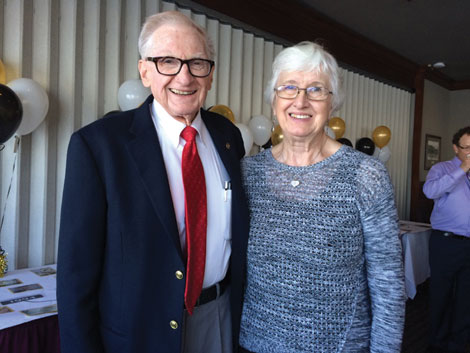‘We are in the business of producing smiles’
Don Hansen’s vision reached another milestone when Cascade Park Communities recently celebrated the 20th anniversary of its memory care facility, Cascade Park Gardens, with an in-house celebration and a private party at C.I. Shenanigans.
The vision of the Gardens began in 1994 when Hansen, a local businessman and licensed professional engineer, perceived a lack of affordable senior living facilities in the Puget Sound region when he was investigating the options for his then 85-year-old father. Hansen found that many organizations offered living accommodations, but the services and prices appeared to be beyond the scope of the average senior citizen. Additionally, he decided that most existing facilities didn’t offer fulfilling senior activities.
From that observation, Hansen moved forward with the design and construction of Cascade Park Gardens, a 95-bed licensed boarding home located in south Tacoma which held its grand opening in 1995. Hansen remains active in the business the manager and president of Cascade Park Communities.
In 1998, Hansen had the opportunity to purchase a second community, the former Grand Vista, located near downtown Tacoma. He soon renamed it Cascade Park Vista, and this 112-room facility became Cascade Park Communities’ operational headquarters. Formerly the Doric Hotel, Cascade Park Vista is located in the heart of the Stadium Historical District and is a thriving home to over 100 vulnerable seniors/adults, many of whom are funded by the state’s Medicaid program, which aligns with Hansen’s passion and commitment to offer a safe, comfortable, vibrant community to those in need of assisted living without regard to their financial situation.
Following the purchase of Cascade Park Vista, which was open assisted-living, Hansen decided to convert the Gardens into a specialized, secure memory care community. Hansen said there was a need in the community for such a facility.
Today, as Cascade Park Gardens celebrates its 20th anniversary, 80 residents with Alzheimer’s or dementia call it home. It also provides jobs for 60 people, several of whom have been with the company for the entire 20 years.
Hansen, who is now in his 80s himself, is still dedicated to bringing Tacoma affordable assisted-living and adult day services. He said the caring staff helps the assisted-living residents and day health participants enjoy day-to-day living with grace and dignity. The emphasis of the communities is to provide safe, comfortable and competent assisted care, and to promote independence by encouraging individuals to stay active within our supportive environments.
A spokeswoman for his company said Hansen is conjuring up yet another way to serve seniors and adults in need throughout Pierce County and beyond. You just never know what the next 20 years might bring, she noted. As Hansen says, “We are in the business of producing smiles.â€
